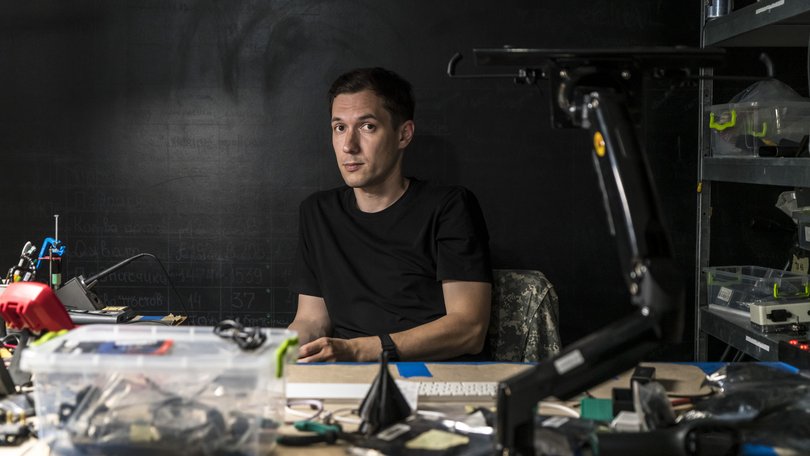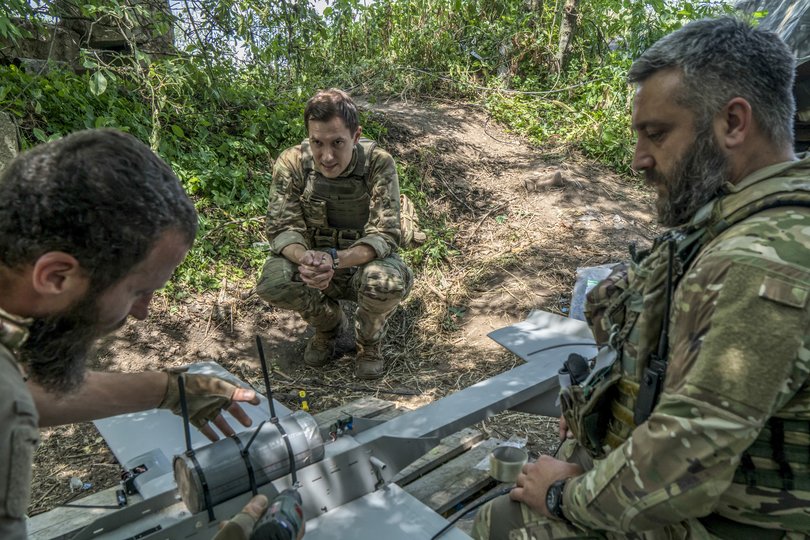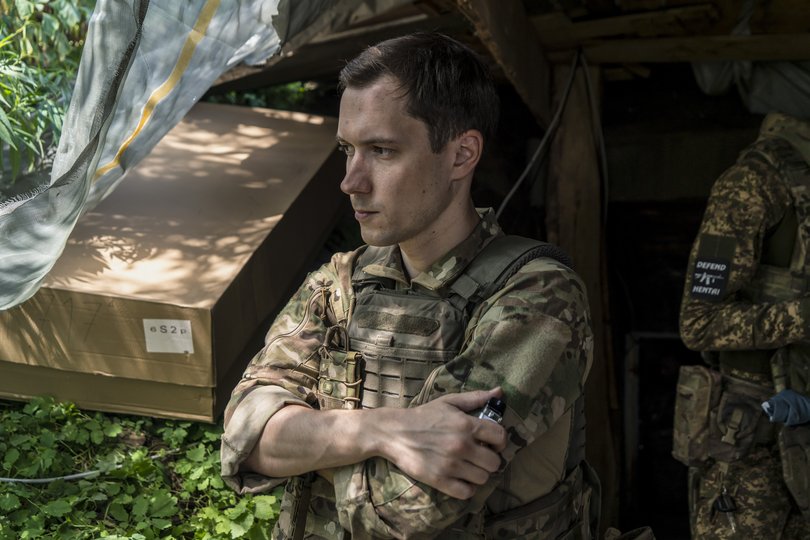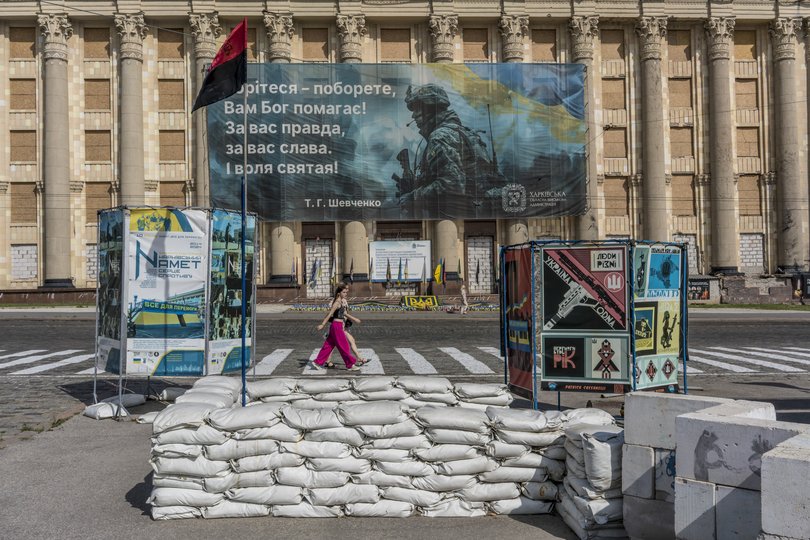THE NEW YORK TIMES: He was a star in Russia’s media world, now he’s a corporal in Ukraine’s army
THE NEW YORK TIMES: ‘What’s the point of writing another story about the war?’

Until a couple of years ago Peter Ruzavin was a wunderkind of Russian opposition journalism. Starting at age 18, he worked as a reporter and then a host at TV Rain, the country’s leading independent channel.
Then, as a podcaster, he covered Russian prisons and the war in Ukraine. Now, at 34, he is a corporal in uniform — a Ukrainian uniform. He serves with a drone unit in Kharkiv. “I feel lucky,” he told me when I visited him there recently.
It’s a fair assumption that most people living in Kharkiv these days don’t feel that way. Ukraine’s second-largest city is just 20 miles from the front line. In the center of town, one cannot walk a block without seeing boarded-up windows where glass was blown out by bomb blasts.
Sign up to The Nightly's newsletters.
Get the first look at the digital newspaper, curated daily stories and breaking headlines delivered to your inbox.
By continuing you agree to our Terms and Privacy Policy.In the bedroom suburbs to the east, entire blocks of Soviet-era high-rise apartment buildings lie in ruins. To Ruzavin, the city’s exposed struggle is a relief compared with the eerie near-normality of Kyiv, where he lived for several years, or the gentility of the Western capitals where many of his former colleagues ended up — not to mention the mind-scrambling opulence of Moscow, where he grew up and became a journalist.
Ruzavin and I have many mutual acquaintances from the Moscow media world. Most of them fled Russia. Some continue to work as journalists for Russian media in exile.
Others try to find ways to push against Vladimir Putin’s war by supporting political prisoners at home, helping Russians evade military service or making donations to the Ukrainian armed forces. Ruzavin, on the other hand, gets to be a part of the Ukrainian war effort. “It’s an honor, really,” he said.
For a long time, longer than anyone could have predicted, the Russian invasion of Ukraine felt like an incomprehensible aberration, a bizarre interruption of life.
It would end, and Kharkiv would once again be full of international students, Odesa’s beaches would be crowded with tourists and the millions of people who fled to Western Europe — most of them women and children — would come home.
None of this seems likely anymore. Along the 750-mile front line, a trench war keeps grinding on. Most nights, Ukrainian cities and towns come under Russian bombardment. Last year Kharkiv opened its first underground school; rather than a building with a bomb shelter, this one is all bomb shelter.
Western media is filled with reports on negotiations about ending the war, but on the ground in Ukraine these look like what they are: an empty spectacle.
“I’ve accepted internally that Putin will be around for another 15 years,” Ruzavin said. “As long as Putin is around, the war” — or the threat of war, anyway — “continues.”
War is life now, and for the foreseeable future. And Ruzavin is living this life in a way that’s rare even in the best of times: with a daily sense that he is exactly where he should be, doing exactly what he should be doing. No wonder he calls himself lucky.
Ruzavin first got the idea to enlist in the summer of 2023, when he was hiking in the Carpathian Mountains with his wife, Nataliya Gumenyuk, who is one of Ukraine’s best-known journalists.
He told me about it a few weeks later. He presented it as a decision, but it was clear that he was still just getting used to the idea himself.
“What’s the point of writing another story about the war?” he asked.
Having written several myself, I knew what he meant. A lot of other journalists do, too. No matter how hard you try, the stories become repetitive.
People start ignoring them, or reading them, as Susan Sontag once wrote, only to reassure themselves that they “are not accomplices to what caused the suffering.”

Because he is married to a Ukrainian — Ruzavin and Gumenyuk wed in 2017, and celebrated in Belarus so that friends from each of their warring countries could attend — Ruzavin had been spending much of his time in Ukraine.
After the full-scale invasion he was one of the few Russian journalists able to work there, and the only one permanently on the ground. He made a raw, original, heartbreaking podcast about the first months of the invasion. Gumenyuk started a journalist-led project to document war crimes in Ukraine.
They spent much of the first year of the war traveling the country together, wearing black bulletproof vests and helmets with the word “PRESS” in bold lettering. And then Ruzavin grew overwhelmed by the sense of futility of fighting aggression with journalism.
I sympathised with Ruzavin’s frustration, but I was taken aback by his decision. He was a very good journalist, a brave reporter and a masterful storyteller. He is also a very skinny guy whose main extracurricular activity growing up was choir. How was his body on the front line going to do more good than his words and his voice?
I visited him this summer, and over the course of two days of walking and driving around Kharkiv, he told me he had wrestled with the same question.
“Who can make a greater contribution: Ruzavin the Ukrainian soldier or Ruzavin the Russian journalist?” It’s hard for a journalist to measure his impact, but the army has a very simple metric: the number of “kills,” whether of enemy combatants or of Russian equipment. Ruzavin has apparently done all right. “I’ve concluded that Ruzavin the Ukrainian soldier can make a greater contribution.”
The Ukrainian armed forces have created separate units for foreigners, including several specifically for Russians, but Ruzavin wanted to fight as a resident of Ukraine, not as an outsider.

While he waited for clearance to join a Ukrainian brigade, he trained. He learned to shoot. He learned to pilot drones. Finally, he was cleared to join Brigade 13 of the Ukrainian National Guard, better known as Khartiia — charter — which started, as several Ukrainian military units did, as a grassroots group of volunteers in the early days of the invasion.
In the spring of 2024, Ruzavin left Kyiv for basic training with Khartiia. He recorded audio for a possible second season of his podcast, and continued recording through training and as he started his regular service.
He was still a journalist, only now he was a journalist and a soldier. And then he was at the front. Within a month, he and two buddies found themselves under fire.
As they tried to retreat, an ordnance exploded nearby. Ruzavin fell — he’d been hit in the leg. He saw one of the other soldiers lying just a yard away, his helmet mangled and his face frozen. You can hear the whole thing on his recordings, including the moment Ruzavin remembers that the soldier was two weeks away from a leave to see his family.
Crawling and huffing, Ruzavin emits a long string of obscenities.
“Did you apply a tourniquet?” Another man’s voice cuts in.
“A tourniquet? To myself? No. It’s not that kind of wound; it’s just a cut.”
It sounds like the severely injured soldier is trying to get up. Someone tells him to stay still.
“Poor guy,” Ruzavin says, cursing again. “He was lying there, not responding to anything, and we were still under fire. And then he started screaming. I was sure that he was ….”
The wounded soldier screams in agony.
“He is hit in the neck, too?”
“Yes, the neck, too,” Ruzavin responds.
Help eventually arrives. Ruzavin rides to the hospital with his friend. At some point he is no longer cursing, but reassuring his buddy tenderly that he is there, by his side.
Miraculously, the soldier survived. The audio from Ruzavin’s own visits to the hospital indicates that his injury was relatively minor, and that he is more afraid of needles than of bombs. He returned to the service within weeks with his first medal. And he stopped recording. Maybe it was then, at the end of the summer of 2024, that he stopped being a journalist and really became a soldier.
He has edited his audio recordings but hasn’t released them yet. The podcast would need a new name. The first season was titled “Fuck the War.” That branding no longer fits.
Ruzavin is not currently in the trenches. He spends his days driving around, solving incremental problems, most of which he couldn’t tell me about. Something had to be delivered somewhere.
A training field for working out a particular drone maneuver needed to be scoped out. He drives back and forth near the front line, down country roads lined with fishing nets — makeshift fences that protect vehicles from drones.
The first time Ruzavin visited these parts was in the fall of 2022, when the first Ukrainian counteroffensive liberated the Kharkiv suburbs. Back then the roads were lined with the carcasses of buses full of the charred remains of Russian special forces soldiers.
Now there are only the occasional ruins of a gas station or a bus stop. The fields along the roads lie fallow, overgrown with white, blue and purple flowers.
People use whatever skills they had in their old professional lives. A chef has turned into a great unit commander. A DJ who still dresses the part is one of the best drone pilots in the brigade.

It’s a people’s war, war that is a part of city life. Ruzavin has noticed that the control room of his drone unit looked like the television control rooms he used to work in: screens along the walls, an island of keyboards and handles in the middle. “Except there is no time to deliberate, to prepare something, to come up with ideas,” he says. “It’s like being live on air 24/7.”
In Kharkiv, he lives in an apartment he rents with several other soldiers. Few Ukrainian service members live in barracks, in no small part because sleeping in barracks would make them an easy target.
The apartment is all tile, mirrors and lacquer, someone’s idea of luxury. Save for a few toothbrushes and razors in the bathroom and some duffel bags piled in a corner, it’s hard to believe that someone actually lives there. That’s because the residents come for a few hours at a time to shower and sleep.
Ruzavin used to love to sleep. He spent much of his professional life carving out space to work on his own, without going to an office or reporting directly to anyone. To his surprise, he has discovered that he likes his new life, even though he sleeps much less, has no control over his schedule and can exercise very little agency. But then again, he has all the agency in the world.
“War gives you this feeling, this justifiable feeling, of doing something valuable,” he told me. Not feeling helpless — in a country that has been under relentless fire for 3 1/2 years, a country whose very existence is questioned by faraway men who have the ability to obliterate it — that feels like the ultimate luxury.
This article originally appeared in The New York Times.
© 2025 The New York Times Company
Originally published on The New York Times
